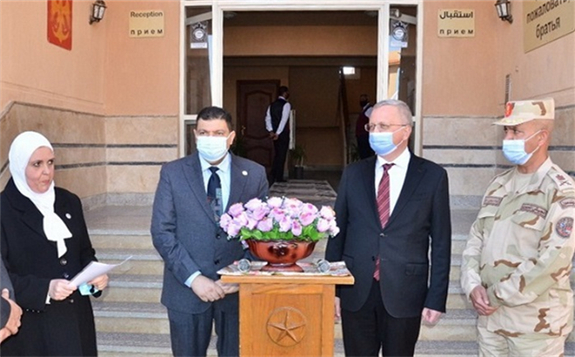The importance of Egypt's first nuclear power plant is comparable to that of the Aswan High Dam, Russia’s Ambassador to Egypt Georgy Borisenko said yesterday. Built across the Nile in Aswan, Egypt, between 1960 and 1970, the world's biggest embankment dam was designed by the Moscow-based Hydroproject Institute. Borisenko made the comparison during a visit to the El Dabaa plant's construction site, together with the chairman of Egypt’s Nuclear Power Plants Authority (NPPA), Amged El-Wakeel.

Four Russian-designed VVER-1200 pressurised water reactors are planned for El Dabaa, which is on the Mediterranean coast, 170km west of Alexandria and Zafraana on the Gulf of Suez. Russian state nuclear corporation Rosatom is developing the plant, which will be owned and operated by the NPPA. With a nameplate capacity of 4.8 GWe, the plant is expected to account for up to 50% of Egypt’s power generation capacity to meet the country’s increasing demand for electricity.
According to a Rosatom statement, Borisenko said: “The El Dabaa NPP project is the largest joint project between Moscow and Cairo. Not only does it reinforce our traditional relations with dignity, but also brings them to a new strategic height. In importance, the implementation of this project is comparable to that of the Aswan Dam Hydroelectric Project, which was realised by our countries during the Soviet period. I am confident that the El Dabaa NPP project too will be a successful demonstration of the highest professionalism by Russian and Egyptian specialists and will make a significant contribution to Egypt’s social and economic development, providing the country with clean and affordable energy for decades to come."
El-Wakeel added that construction of the El Dabaa plant is one of Egypt's most ambitious projects currently. "It is the realisation of the dream of a peaceful nuclear programme that the Egyptian people have cradled since the 20th century. In light of the station’s importance for the country’s future economic development and for its energy sovereignty, it was crucial for us to choose a reliable partner with a proven track record, and we are glad to have found such a partner in Russia, our long-time ally and friend. We are convinced that advanced Russian technologies, coupled with the Egyptian sense of diligence, will be key to the success of this grandiose project."
The delegation also included Russia’s trade representative to Egypt, Nikolay Aslanov, Russia’s consul general in Alexandria, Karen Vasilyan, the leadership of the Russian Centre for Science and Culture in Alexandria, representatives of Rosatom’s engineering division ASE JSC (including the director of El Dabaa NPP Project, Grigory Sosnin, and the director for nuclear power plant construction in Egypt, Anatoly Kovtunov), as well as Rosatom's director for the Middle East and North Africa, Alexander Voronkov.
The Egyptian side of the delegation included the vice chairman of NPPA and chief curator of the El Dabaa NPP project, Mohamed Ramadan, and the vice chairman for engineering projects, Mohammed Youssef.
After touring the construction site of the future reactor units, the delegation visited the seaport that will be dedicated to transporting heavy equipment to the plant.
The El Dabaa nuclear power plant project is based on contracts that entered into force on 11 December 2017. These stipulate that Rosatom will not only build the plant, but will also supply Russian nuclear fuel for its entire life cycle. They will also assist Egyptian partners in training personnel and plant maintenance for the first 10 years of its operation. Rosatom is also contracted to build a special storage facility and supply containers for storing used nuclear fuel.
There are four VVER-1200 units already in operation in Russia - two at Novovoronezh II and two at Leningrad II. The first VVER-1200 to be built outside Russia is at Ostrovets, in Belarus.
Formerly the director of the North America desk at the Russian Foreign Ministry, Borisenko was appointed Russian ambassador to Egypt and Russian plenipotentiary to the League of Arab States by Russian President Vladimir Putin in April 2020.